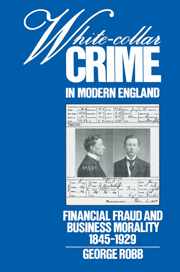Book contents
- Frontmatter
- Contents
- List of tables
- Acknowledgments
- Introduction: White-collar crime and the criminal “upperworld”
- 1 The new economy: transformation of finance and opportunities for crime
- 2 The Railway Mania
- 3 Banking and credit fraud
- 4 Stock fraud
- 5 Company fraud: promotion
- 6 Company fraud: management
- 7 Company law and the courts
- 8 Business ethics and professionalization
- Conclusion: Final considerations
- Notes
- Bibliography
- Index
7 - Company law and the courts
Published online by Cambridge University Press: 08 December 2009
- Frontmatter
- Contents
- List of tables
- Acknowledgments
- Introduction: White-collar crime and the criminal “upperworld”
- 1 The new economy: transformation of finance and opportunities for crime
- 2 The Railway Mania
- 3 Banking and credit fraud
- 4 Stock fraud
- 5 Company fraud: promotion
- 6 Company fraud: management
- 7 Company law and the courts
- 8 Business ethics and professionalization
- Conclusion: Final considerations
- Notes
- Bibliography
- Index
Summary
The story of English company law during the nineteenth and twentieth centuries is the story of the rise and fall of laissez-faire. As we have seen, the various agents of English finance and trade operated under the most permissive commercial legislation in all of Europe, if not the world. From the mid-nineteenth century through the early decades of the twentieth, the law put few obstacles in the paths of white-collar criminals, trusting instead that the free market would regulate itself and that good business would drive out bad. The liberal outlook was taken up by the law courts which neglected business frauds and treated white-collar criminals with comparative leniency. Throughout much of this period, cultural perceptions of “criminality” remained focused on the “dangerous classes” while elite misconduct was seen as a relatively minor social ill. Experience, however, proved increasingly irreconcilable with classical economic theory and class prejudice. The speculative disaster of 1866, the fraudulent loan issues of the 1870s and the crash of the City of Glasgow Bank in 1878 brought to light a system of finance riddled with fraud. Thus, from the 1880s there was an ideological shift in favor of greater state regulation of the economy to protect investors. Thereafter, the movement for the reform of company law gained momentum with each new revelation of fraud. Balfour, Hooley, Wright, Bottomley, Bevan and Hatry all contributed to the weakening of free trade doctrines among legislators, the business community and the general public.
In 1844 the British Parliament attempted to regulate joint-stock company affairs for the first time.
- Type
- Chapter
- Information
- White-Collar Crime in Modern EnglandFinancial Fraud and Business Morality, 1845–1929, pp. 147 - 168Publisher: Cambridge University PressPrint publication year: 1992
- 1
- Cited by



